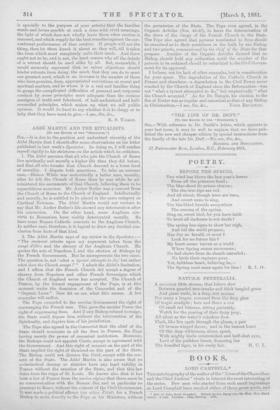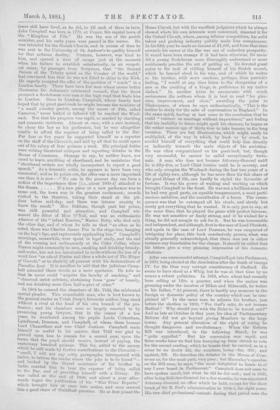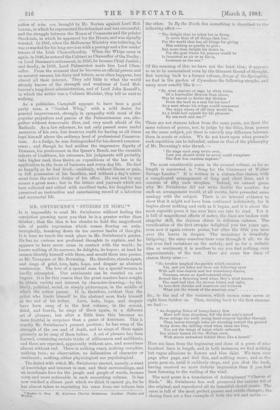B 00 K S.
LORD CAN Tuns autobiography of the author of the" Lives of the Chancellors and the Chief Justices" rivals in interest the most interesting of the series. Few men who started from such small beginnings as Lord Campbell have reached either of those great posts, and _
Life of Johg, Lord Gonp601, Edited by Ilia Laval ter, tho Bon, Mrs. Hard- cantle, 2 rum,. London John Murre.y. 1881.
fewer still have lived, as he did, to fill each of them in turn. John Campbell was born in 1779, at Cupar, the capital town of the "Kingdom of Fife." He was the son of the parish minister, and his early years were passed in the manse. He was intended for the Scotch Church, and in course of time he was sent to the University of St. Andrew's to qualify himself for that arduous destiny. Fortune, however, was kind to him, and opened a door of escape just at the moment when his failure to establish satisfactorily, in an exegeti- cal essay, by passages from Scripture, that "the Second Person of the Trinity acted as the Creator of the world," had convinced him that he was not fitted to shine in the Kirk. Ho eagerly accepted the offer of the position of " coach" in a London family. There have been few men whose career better illustrates Dr. Johnson's celebrated remark, that the finest prospect a Scotchman ever sees is the high road that leads him to London. Once in London, Campbell, whose family had hoped that by great good-luck he might become the minister of " a small country parish, among the moors of Fife, called Cameron," never halted. or faltered till he reached the Wool- sack. Not that his progress was rapid, or marked by startling and romantic incidents. Almost at once, with a sure instinct, he chose the law as his profession, but he was altogether unable to afford the expense of being called to the Bar. For four or five years he supported himself as a reporter on the staff of the Chronicle, and laid by all that he could spare out of his salary of four guineas a week. His principal duties were writing theatrical critiques and reporting debates in the House of Commons. Strange to say, he neither knew, nor eared to learn, anything of shorthand, and he maintains that " shorthand writers are wholly incompetent to report a good speech." As a dramatic critic, he appears to have been very successful; and as he points out, the office was a more important one than it is now :—" No one in the present clay can form a notion of the importance then [i.e., about 1800.4] attached to the drama If a new piece or a new performer was to come out, the town was in the greatest excitement; crowds rushed to the theatres, taking their stand at the pit. door before mid-day, and there was intense anxiety to know the result." Mrs. Siddons, though past her prime, was still powerful and attractive, and Campbell Wit- nessed the debut of Miss O'Neil, and was an enthusiastic admirer of the " infant Roscius," Master Betty, who died only the other day; and of whom he tells us that " as often as he acted, there was Charles James Fox in the stage-box, hanging on the boy's lips, and rapturously applauding him." Campbell's mornings, meanwhile, were spent in legal study, and the end -of the evening not unfrequently at the Cider Cellar, where Porson might constantly be seen, smoking and drinking brandy- and-water, but not too intoxicated to recite without the loss of a word first "an ode of Pinder and then &whole act of The Mayor of Garrett," or to electrify all present with his declamations of Paradise Lost. It is needless to add that the judicious Camp- bell attended these revels as a mere spectator. He tells us that he never could "acquire the faculty of smoking," and observed strict sobriety, abstaining from ` goes ' of brandy, and not, drinking more than half-a-pint of cider."
In 1804 he entered the chambers of Mr. Tidd, the celebrated special pleader. This remarkable man, who is best known to the general reader as Uriah Heep's favourite author, long stood Without a rival at the head of his own branch of the pro- fession; and his chambers were so largely resorted to by promieing young lawyers, that in the course of a few years he numbered among his pupils Lords Cotteuham, Lyndhurst, Denman, and Campbell, of whom three became Lord Chancellors and two Chief Justices. Campbell made himself so useful to his master, that Tidd was glad to prevail upon him to remain for a second year, upon the -terms that the pupil should receive, instead of paying, the euetomary hundred guineas. This fee, added to the money which he still made by furtive contributions to the Clcronic?e-
small, I will not say witty, paragraphs, interspersed with italics, to inform the reader where the joke is to be found "- and, backed by the liberal assistance of his brother in India, enabled him to bear the expense of being called to the Bar, and of providing himself with a library. He was called at the end of 1806, and about a year after- wards began the publication of his "Nisi Prins Reports," which brought him at once into notice, and soon secured him a good share of Guildhall practice He at first joined the Home Circuit, but with the excellent judgment which he always showed where his own interests were concerned, deserted it for the Oxford Circuit, where, among inferior competitors, his solid talent and pushing industry quibkly made him conspicuous. In his fifth year he made an income of 21,000, and from that time onwards his career at the Bar was one of unbroken prosperity.
It would have been strange if it had been otherwise, for never did a young Scotchman more thoroughly understand or more assiduously practise the art of getting On. He devoted great pains to the task of ridding himself of his Scotch accent, which he fancied stood in his way, and of which he writes to his brother, with more candour, perhaps, than patriotic feeling, "I would at any time listen to the sharpening of a saw or the creaking of a hinge, in preference to my native dialect." In another letter he enumerates with much seriousness the authors whom it is best to read "for plea- sure, improvement, and show," awarding the palm to Shakespeare, of whom he says enthusiastically, "This is the
author to study for the sake of conversation in England." In the same spirit, having at last come to the conclusion that he could "venture on marriage without imprudence," and feeling that his inability to dance might spoil his chances, he began at the rather mature ago of thirty-four to take lessons, in the long vacation. These are but illustrations, which might easily be multiplied, of the way in which, by hook or by crook, he availed, himself of everything that could help him directly or indirectly towards the main objects of his ambition. He was often congratulated on his good-luck, but, though very successful, he cannot be called exceptionally fortu- nate. A man who does not became Attorney-General until he is fifty-five, or Lord Chief Justice until he is seventy, and who only occupies the Woolsack daring the last two years of a life of eighty-two, although he has more than his fair share of the good things of life, can hardly be styled the favourite of fortune. It was his power of waiting and working on which brought Campbell to the front. He was not a brilliant man, but he had very good parts, an equable temperament, a most perti- nacious ambition, and the constitution of a horse. The come. queue was that he outstayed all his rivals, and slowly but surely got everything that he wanted. It-is only just to say, at the same time, that he played the game with perfect fairness. He was not sensitive or finely strung, and if he wished for a thing, he did not scruple to ask for it. But he was honourable and independent, and although, first in the case of Lord Plunkett, and again in the case of Loicl Denman, he was suspected of intriguing for place, this book conclusively proves, what was already generally acknowledged, that there was not in either instance any foundation for the charge. It should be added that his letters give a very pleasing impression of his domestic relations.
After one unsuccessful attempt, Campbell got into Parliament, in 1830, being elected at the dissolution after the death of George IV. for the then very corrupt constituency of Stafford. He seems to have stood as a Whig, but he was at that time by no means a robust politician. In 1818, when wheat had recently been selling at 120s. a quarter, and when the nation was groaning under the incubus of Eldon and Sidinouth, he writes to his father, " At present, there is hardly any measure in the foreign or domestic policy of the country which can be com- plained of." In the same tone he adjures his brother, just before the election in 1830, "For God's sake, do not become Radical ! Why should you wish the Duke to be forced out ?" And as late as October in that year, his idea of Parliamentary Reform did not go beyond giving Members to the large towns. Any general alteration of the right of voting he thought dangerous and revolutionary. When the Reform Bill was introduced, in the following March, he was "quite appalled." But his conversion WAS rapid, and three weeks later we find him hurrying up from circuit to vote for the second reading, which he boasts that he carried, as in a sense he no doubt did, the numbers, being—for, 302 ; and against, 301. He describes the debates in the House of Com- mons as, for the most part, very poor ; but Macaulay's speeches on the Bill were, he says, "the most delightful to listen to of any I ever heard in Parliament." Campbell does not seem to have spoken much, but whet he did he did well ; and in 1833, after being Solicitor-General for a few months, he was appointed Attorney-General, an office which he held, except for the short break.of Sir R. Peel's administration in 1834-5, for eight years. His two chief professional contests during that period were the action of erim. con. brought by Mr. Norton against Lord Mel- bourne, in which he represented the defendant and was successful; and the struggle between the House of Commons and the printer Stockdale, in which he appeared for the House, and was signally worsted. In 1841, when the Melbourne Ministry was tottering, he was rewarded for his long services with a peerage and a few weeks' tenure of the Irish Chancellorship. When the Whigs came in again, in 1846, he entered the Cabinet as Chancellor of the Duchy; on Lord Penman's retirement, in 1850, he became Chief Justice ; and finally, in 1859, Lord Palmerston made him Lord Chan- cellor. From the moment that he becomes an official person and an assured success, his diary and letters, as so often happens, lose almost all their interest. They add little to what the world already knows of the strength and weakness of Lord Mel- bourne's long-lived administration, and of Lord John Russell's, in which the writer was a Cabinet Minister, they tell us next to nothing.
As a politician, Campbell appears to have been a good party man, a "limited Whig," with a mild desire for general improvement, strongly in sympathy with most of the popular prejudices and panics of the Palmerstonian era, alto- gether without democratic fibre, and very much afraid of the Radicals. As a law reformer, he not only passed some useful measures of his own, but deserves credit for having at all times kept himself above the ordinary level of professional Conserva- tism. As a Judge, he was distinguished for his shrewd common- sense ; and though he had neither the impressive dignity of Denman, his predecessor in the Queen's Bench, nor the versatile talents of Cockburn, his successor, his judgments will probably take higher rank than theirs, as expositions of the law in its application to the facts of business and every-day life. He died as happily as he had ]ived,—suddenly, without illness or pain, in full possession of his faculties, and without a day's retire- ment from the active duties of his office. He was not by any means a great man ; but in the letters and journals which are here collected and edited with excellent taste, his daughter has preserved an instructive and entertaining record of a laborious and successful life.




































 Previous page
Previous page